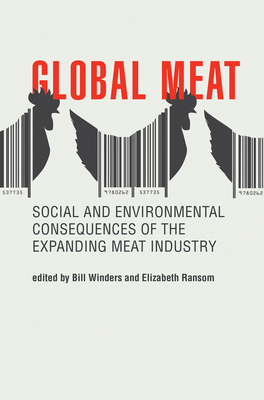

 MIT Press
MIT Press
Global Meat: Social and Environmental Consequences of the Expanding Meat Industry


Key Metrics
- Bill Winders
- MIT Press
- Paperback
- 9780262537735
- 9.3 X 6.2 X 0.7 inches
- 1 pounds
- Political Science > Public Policy - Environmental Policy
- English
 Secure Transaction
Secure TransactionBook Description
Global meat production and consumption have risen sharply and steadily over the past five decades, with per capita meat consumption almost doubling since 1960. The expanding global meat industry, meanwhile, driven by new trade policies and fueled by government subsidies, is dominated by just a few corporate giants. Industrial farming--the intensive production of animals and fish--has spread across the globe. Millions of acres of land are now used for pastures, feed crops, and animal waste reservoirs. Drawing on concrete examples, the contributors to Global Meat explore the implications of the rise of a global meat industry for a range of social and environmental issues, including climate change, clean water supplies, hunger, workers' rights, and the treatment of animals.
Three themes emerge from their discussions: the role of government and corporations in shaping the structure of the global meat industry; the paradox of simultaneous rising meat production and greater food insecurity; and the industry's contribution to social and environmental injustice. Contributors address such specific topics as the dramatic increase in pork production and consumption in China; land management by small-scale cattle farmers in the Amazon; the effect on the climate of rising greenhouse gas emissions from cattle raised for meat; and the tensions between economic development and animal welfare.
Contributors
Conner Bailey, Robert M. Chiles, Celize Christy, Riva C. H. Denny, Carrie Freshour, Philip H. Howard, Elizabeth Ransom, Tom Rudel, Mindi Schneider, Nhuong Tran, Bill Winders
Author Bio
Bill Winders is a Professor in the School of History and Sociology. He received his PhD in sociology from Emory University in 2001 and specializes in the areas of political sociology, social movements, the world economy, inequality, and food and agriculture.
Dr. Winders has authored two books. His first book, The Politics of Food Supply: US Agricultural Policy in the World Economy (Yale University Press, 2009), shows how political coalitions and divisions between farmers in the South, Corn Belt, and Wheat Belt shaped the trajectory of US agricultural policy from the 1920s to the the early 21st century. This book also highlights the influence of the world economy and the civil rights movement on agricultural policy. The Politics of Food Supply won the 2011 Book Award from the Political Economy of the World-System (PEWS) section of the American Sociological Association, an award given each year in recognition of a book that exemplifies outstanding scholarship in global or comparative-international sociology.
His second book, Grains (Polity Press, 2017), examines the geopolitics of grains, focusing on maize, rice, and wheat. In Grains, Winders examines how the political and economic divisions between food grains and feed grains influence a variety of issues, including international trade, world hunger, biotechnology, and land rights.
Dr. Winders co-edited a book with Dr. Elizabeth Ransom (Penn State) titled, Global Meat: Social and Environmental Implications of the Expanding Meat Industry (MIT Press, 2019). The scholars who contributed to this edited volume examine the contours of the global meat industry in terms of production, consumption, and trade, as well as the implications for the environment, workers, animals, farmers and small holders, and even the economy. Global Meat is part of the "Food, Health, and the Environment" Series at MIT Press and was named a Choice “Outstanding Academic Title” for 2020 and “Community College Top 75” for July 2020.
In addition to these books, he has published several articles in journals such as Social Forces, Politics & Society, Social Problems, Rural Sociology, and Journal of Agrarian Change among others. These articles examine various topics such as the politics of national policies, voter turnout, social movement dynamics, and the global context of food and agriculture.
His article "The Vanishing Free Market: The Formation and Spread of the British and US Food Regimes" (Journal of Agrarian Change, 2009, 9(3):315-344) received the Bernstein & Byres Prize for Best Article in JAC in 2009.
In 2016, Winders and several graduate students published an article that examines how shifts in global governance after 1975 contribute to greater market instability for various agricultural commodities, including coffee, wheat, and soybeans, among others. See "Life After the Regime: Market Instability with the Fall of the U.S. Food Regime," Agriculture and Human Values 33(1):73-88.
Professor Winders is currently working on two primary research projects. The first project examines the global meat industry, focusing on the production, consumption, and trade of meat in the world economy. The second project examines food crises in the world economy, such as the 2007-2008 food crisis that saw food prices and world hunger rise dramatically.
Research Interests
- Food And Agricultural Policy
- National Policies
- Political Sociology
- Social Movements
- Sociology Of Development
- Voting And Elections
Education
- PhD, Sociology, Emory University (2001)
- MA, Sociology, Southern Illinois University at Carbondale (1995)
- BA, Sociology, McKendree University (1993)
Source: Georgia Institute of Technology
Videos








Community reviews
Write a ReviewNo Community reviews